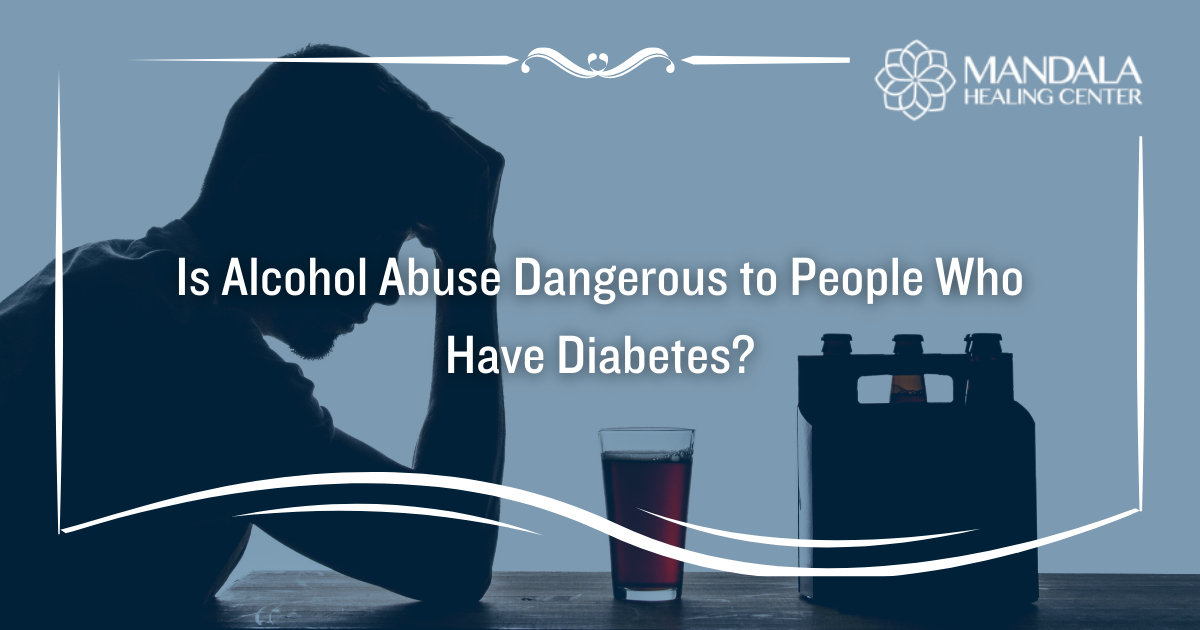Diabetes is a serious yet common health condition that affects millions of Americans. According to the CDC, “37.3 million Americans—about 1 in 10—have diabetes. About 1 in 5 people with diabetes don’t know they have it.”[1]
While people diagnosed with diabetes know they need to limit their sugar intake, they may be unaware of the effects of alcohol abuse. Heavy alcohol consumption can affect your body in several ways, including the health of your heart, liver, and brain. However, drinking alcohol in excess can also affect your body’s ability to regulate sugar.
Because alcohol can mess with the sugar levels in your body if you suffer from diabetes you have to be extremely careful when you drink. Controlling your drinking can be very difficult if you suffer from alcoholism, though. Alcoholism affects your ability to moderate and control your alcohol consumption. Thankfully, professional alcohol use disorder treatment programs can help you overcome the disease of alcoholism and teach you how to manage your diabetes effectively.
How Does Alcohol Abuse Affect Your Diabetes?
When you drink alcohol, it slows down the activity in your brain and body, causing an array of effects including feelings of relaxation, drowsiness, and coordination issues. Drinking alcohol can make you less aware of how your body is feeling, due to disorientation, confusion, and forgetfulness. This alone can be dangerous for someone who suffers from diabetes, as you might forget to take your medication or fail to notice when your sugar levels are too high or low.
However, alcohol abuse also affects your body’s insulin production, blood sugar, and glucose levels, and can interact negatively with various diabetes medications. For example, drinking small amounts of alcohol can lead to a rise in blood sugar, while large amounts of the substance can lead to extremely low blood sugar (hypoglycemia). If you develop hypoglycemia from excessive alcohol consumption, you could experience life-threatening consequences.
Additional effects of alcohol consumption in diabetics include:
- Increased heart rate and blood pressure
- Nausea
- Confusion
- Slurred speech
- Blurred vision
- An inability to think clearly
- Increased appetite
Symptoms of High or Low Blood Sugar Caused By Excessive Drinking
The main risk of excessive drinking as a diabetic is the inability to distinguish hyperglycemia or hypoglycemia from drunkenness. When a healthy person is extremely intoxicated from alcohol consumption they may experience dizziness or drowsiness. However, these are the main symptoms of dangerously high or low blood sugar in diabetics, so blood sugar issues can easily be mistaken for intoxication.
If you suffer from diabetes and drink too much alcohol you must be aware of the symptoms of hypoglycemia and hyperglycemia. These conditions can lead to dangerous and life-threatening consequences if they are not promptly treated.
Symptoms that may indicate dangerously high or low blood sugar after drinking alcohol include:
- Sleepiness or drowsiness
- Nausea and vomiting
- Stomach pain
- Sweating
- Shaking
- Dizziness
- Weakness of the muscles
- Numbness or tingling of arms and legs
- Confusion
- Loss of consciousness
- Seizures
According to a study published by Johns Hopkins, one-third of the participants in the study who experienced an episode of severe hypoglycemia died within three years. This is because severe cases of hypoglycemia double your risk of cardiovascular disease and death.[2]
If you have diabetes and are struggling to stop drinking alcohol, you must assess your alcohol consumption and receive professional treatment before it causes irreversible effects on your health. An alcohol rehab center can help you quit drinking, allowing you to treat your diabetes and avoid further complications properly.
Health Risks Associated With Drinking Alcohol When You Have Diabetes
While having one drink is unlikely to result in life-threatening consequences if you suffer from diabetes, heavy alcohol consumption can lead to an array of dangerous medical complications. Your risk of experiencing these effects increases substantially when you drink alcohol on an empty stomach.
If you drink heavily, diabetic or not, you could experience damage to your pancreas, kidneys, liver, and heart. Having kidney or liver damage can pose significant health risks if you suffer from diabetes. For example, excessive alcohol consumption limits your liver’s ability to produce insulin, meaning your body’s emergency glucose storage will not be available.
If you have diabetes you most likely take medications to manage it. Alcohol is known to interact negatively with chlorpropamide, metformin, and troglitazone, three of the most common diabetes medications. Drinking alcohol while on these medications can reduce their effectiveness and cause intense bouts of vomiting.
Other health risks of heavy alcohol consumption in people with diabetes include:[3]
- Diabetic ketoacidosis
- Low LDL cholesterol
- High HDL cholesterol
- High levels of triglyceride
- Cardiovascular disease
- Eye disease
- Impotence
Finding Help for Alcoholism as a Diabetic
If you or a loved one have diabetes and suffer from alcoholism, you are at an increased risk of experiencing life-threatening health complications from your diabetes. Alcohol can mess with your sugar levels, leading to dangerous conditions like cardiovascular diseases, eye diseases, coma, and death. While overcoming alcoholism can be difficult, a professional alcohol rehab facility can make the process easier and safer.
At Mandala Healing Center, we have a fantastic nutritional program that can help you get your diabetes under control and provide you with the nutrients you need to recover from the effects of alcohol and improve your overall health.
Our dietician evaluates each new patient at the point of his or her particular phase of recovery. Nutritional re-evaluations are then held at Mandala on an ongoing basis. These private sessions are designed to be collaborative and empowering with an emphasis on instilling healthful, lifelong eating habits. Additionally, patients may participate in special group sessions and fun, hands-on cooking classes where they are taught the valuable life skill of learning to prepare their own healthy foods.
Recovery and better health are just a phone call away. Contact us today to get started.
References:
- https://www.cdc.gov/diabetes/library/spotlights/diabetes-facts-stats.html
- https://publichealth.jhu.edu/2017/severe-hypoglycemia-linked-to-increased-risk-of-death-in-people-with-diabetes
- https://www.ncbi.nlm.nih.gov/pmc/articles/PMC6761899/












